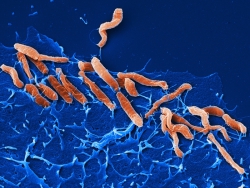Prof. Dr. Peter Mertens
Department of Nephrology, Diabetology and Endocrinology
Prof. Dr. Dimitrios Mougiakakos
Department of Hematology and Oncology
Prof. Dr. Christoph Lohmann
Department of Orthopedics
INFECTIONS WITH HELICOBACTER PYLORI AFFECT THE MICROBIALDIVERSITY IN THE ORAL CAVITY AND THE SMALL INTESTINE
Scientists from the University Hospital Magdeburg and the Helmholtz Centre for Infection Research (HZI) in Braunschweig worked together to research the effect of an infection with the stomach bacterium Helicobacter pylori on the composition of the bacterial colonies – the so-called microbiome – in various ecological niches in the upper digestive system of 24 patients, who either had an infection with Helicobacter pylori or were not infected. In total, over 120 samples were taken from the oral cavity, the stomach, and the duodenum of the patients. Through modern sequencing methods and comprehensive bioinformatics analysis based on the RNA profiles, the researchers could determine in detail which microorganisms are metabolically active at individual locations.
Through this, it was shown that Helicobacter pylori dominates in the mucous membrane of the stomach in infected patients and suppresses other naturally occurring bacteria. The new part of this work is that the bacterial composition in the small intestine is distinctly different in infected and non-infected people. The diversity of the bacteria is reduced in people infected with Helicobacter. In addition, the scientists analyzed the microbiome of the oral cavity and showed that saliva is a natural resource for microbial activity in the subsequent sections of the digestive system. They also found that there was a clear difference between the bacterial profiles of people infected with the stomach bacteria Helicobacter pylori and those who weren’t. Dr. med. Christian Schulz, the first author of the study, said “Through a detailed investigation of the entire digestive situation, we could show that the bacterial colonies in the oral cavity influenced the microbiome of the entire digestive system and could also be jointly responsible for the susceptibility to Helicobacter pylori infections. These relationships must be investigated.” The new results were published in the renowned journal GUT.
 Helicobacter pylori is the “most successful” human pathogen bacterium. Around 50 % of all humans worldwide are infected with Helicobacter pylori. Around 80 % of all infected humans do not exhibit symptoms and the infection remains undetected. Nevertheless, the infection can have fatal consequences for the patients, including stomach cancer. Around 90 % of all stomach cancers can be attributed to Helicobacter. Only in 1989 was it determined that the bacteria are the cause of stomach and duodenal ulcers and stomach cancer. The revelation of this connection was awarded with the Nobel Prize for Medicine in 2005.
Helicobacter pylori is the “most successful” human pathogen bacterium. Around 50 % of all humans worldwide are infected with Helicobacter pylori. Around 80 % of all infected humans do not exhibit symptoms and the infection remains undetected. Nevertheless, the infection can have fatal consequences for the patients, including stomach cancer. Around 90 % of all stomach cancers can be attributed to Helicobacter. Only in 1989 was it determined that the bacteria are the cause of stomach and duodenal ulcers and stomach cancer. The revelation of this connection was awarded with the Nobel Prize for Medicine in 2005.
The cooperation between the University Hospital Magdeburg and the HZI occurs through the “clinical leave” program deploying doctors in research groups for basic research to strengthen transitional research. Through this integration of clinics in research, the results of research should reach the patients more quickly. With the support of the DFG Collaborative Research Centre 854 and the Health Campus Immunology, Infectiology and Inflammation, the University Hospital Magdeburg was able to give Dr. Christian Schulz from the Department of Gastroenterology, Hepatology and Infectiology the opportunity to work with the research group “Microbial Interactions and Processes” of Prof. Dr. Dietmar Pieper at the HZI Braunschweig.
In currently ongoing projects, researchers will figure out how the microbiome of the oral cavity influences the susceptibility to a Helicobacter pylori infection and also investigate the microbial composition in the small intestine. The newly created research connection will also continue and and contribute to figuring out why a bacterium that is in half of all people causes fatal problems such as stomach ulcers and stomach cancer.
Original Publication: The active bacterial assemblages of the upper GI tract in individuals with and without Helicobacter infection. Christian Schulz, Kerstin Schütte, Nadine Koch, Ramiro Vilchez-Vargas, Melissa L Wos-Oxley, Andrew P A Oxley, Marius Vital, Peter Malfertheiner, Dietmar H Pieper.
Photo 1: Dr. med. Christian Schulz (private)
Photo 2: Being infected with Helicobacter pylori also increases the risk of developing stomach cancer. (HZI/M. Rohde)
Prof. Dr. Peter Mertens
Department of Nephrology, Diabetology and Endocrinology
Prof. Dr. Dimitrios Mougiakakos
Department of Hematology and Oncology
Prof. Dr. Christoph Lohmann
Department of Orthopedics
Last Modification: 09.11.2020 - Contact Person: